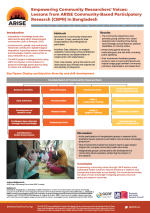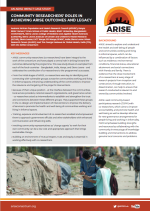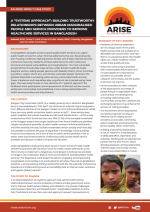This poster was originally presented at the 8th Annual Symposium on Health Systems Research in Nagasaki, Japan. Authors are Muhammad Riaz Hossain, Nazia Islam, Mst. Nusrat Jahan, Tasmiha Amin Oishy, Bachera Aktar and Sabina Faiz Rashid. Inequalities in knowledge production disproportionately affect disadvantaged communities (John & Rempala, 2024). Socioeconomic, gender, and institutional hierarchies contribute to […]
ARISE aimed to explore and understand the health and well-being of people and communities working and living in informal spaces, which can be influenced by a combination of factors such as residence, environmental conditions, financial status, educational attainment and social connections with friends and family. There is evidence that the close involvement of co-researchers at […]
In Bangladesh, equitable access to good quality health services is an urgent public health concern for urban informal settlements that are characterised by poor housing conditions, high population density, lack of basic essential services and tenure insecurity. Residents of these settlements live with continuous structural and spatial vulnerabilities and marginalisation. The most vulnerable groups (MVGs) […]
This photo-narrative book was developed with community members from Green Land (Khulna), Bajekazla (Rajshahi) and Shyampur (Dhaka) communities, as part of the ARISE Responsive Fund in Bangladesh. It tells the stories of how many marginalised people in urban informal settlements of Bangladesh were affected by the COVID-19 pandemic, and how they came together to respond […]
Abstract Vaccine hesitancy or low uptake was identified as a major threat to global health by the World Health Organization (WHO) in 2019. Vaccine hesitancy is context-specific and varies across time, place, and socioeconomic groups. In this study, we aimed to understand the perceptions of and attitudes toward COVID-19 vaccination through time among urban slum […]
Abstract Empirical evidence suggests that the health outcomes of children living in slums are poorer than those living in non-slums and other urban areas. Improving health especially among children under five years old (U5y) living in slums, requires a better understanding of the social determinants of health (SDoH) that drive their health outcomes. Therefore, we […]
“I do not know where I should go” Barriers in Using Sexual and Reproductive Healthcare by Male Adolescents in Bangladesh: Findings From Mixed Method Study This poster by Muhammad Riaz Hossain was presented at the National Adolescent Health Conference in Bangladesh. It was funded by the Embassy of the Kingdom of the Netherlands project titled ‘Understanding Sexual […]
Menstrual Hygiene Management in Informal Urban Settlements in Dhaka: Conversations around taboo, stigma and challenges This poster by Adrita Rahman was presented at the National Adolescent Health Conference in Bangladesh. The poster won first prize at this national event.
Abstract COVID-19 significantly affected people with disabilities, with many facing additional barriers in access to services and increased risks of poor health and social outcomes. Focusing on the impact of COVID-19 in the Global South, this study took place in Bangladesh and Liberia, where 14% and 16% of the population are thought to live with […]
Shahreen Chowdhury, Liverpool School of Tropical Medicine COVID-19 changed the world as we know it. However, the pandemic significantly affected people with disabilities with many facing additional barriers in access to services, increased isolation and increased risks of poor health and social outcomes. This study took place in Bangladesh and Liberia, where there is minimal […]









